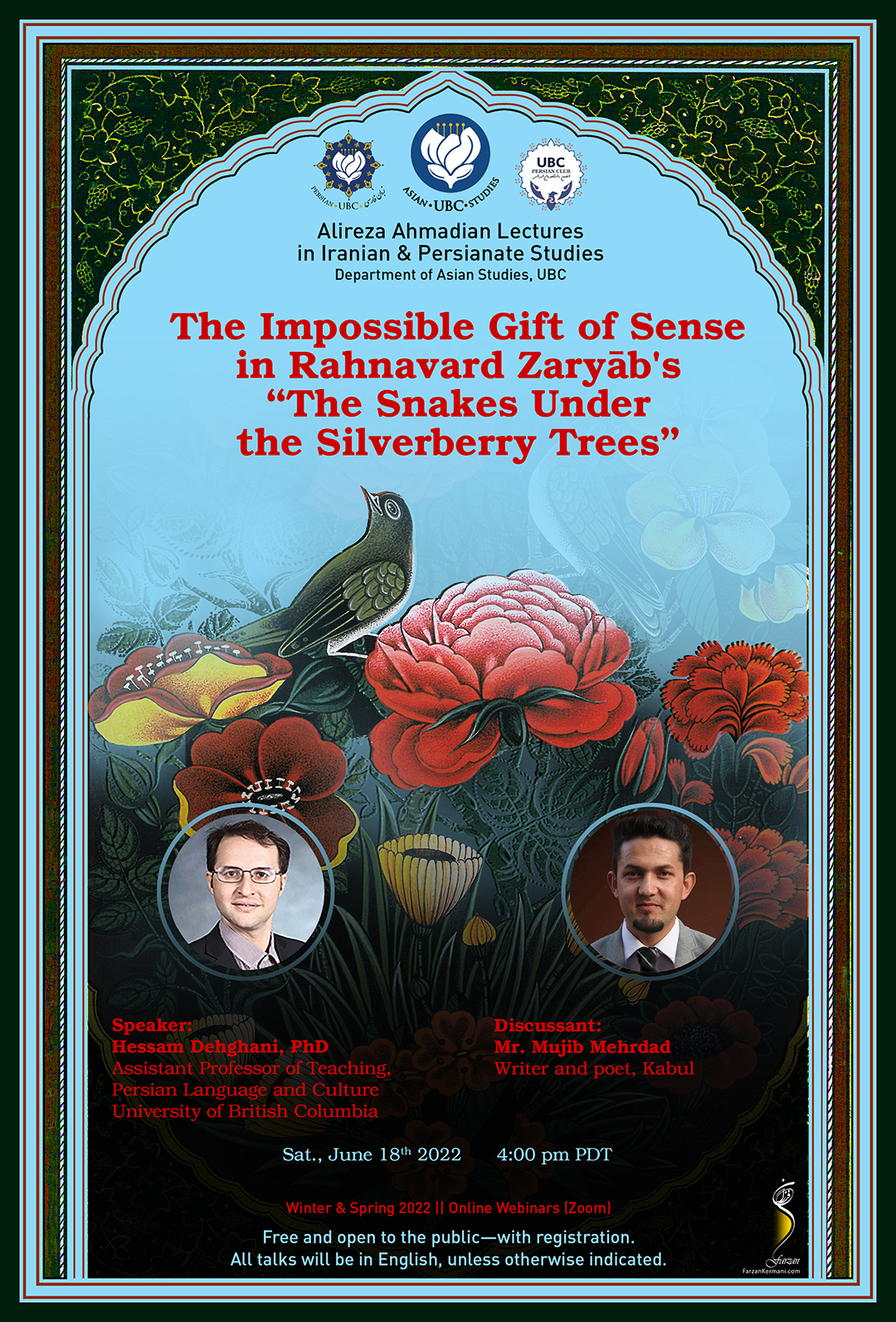

Poster design by Farzan Kermani
هدیهٔ ناممکن معنا در داستان کوتاه مارهای زیر درخت سنجد، نوشتهٔ رهنورد زریاب
سخنران: دکتر حسام دهقانی، استادیار زبان و فرهنگ فارسی، دانشگاه بریتیش کلمبیا
طرفبحث: مجیب مهرداد، نویسنده و شاعر، کابل
محمداعظم رهنورد زریاب (۱۳۲۳ – ۱۳۹۹) یکی از تأثیرگذارترین روشنفکران افغانستان امروزی و کل قلمروی زبان فارسی بود. تأثیر او در عرصههای روزنامهنگاری، ادبیات و نقد فرهنگی-سیاسی و مذهبی همواره نمایان است. او در داستانهای کوتاه و رمانهایش از قدرت رئالیسم جادویی و فراواقعگرایی (سوررئالیسم) استفاده میکند تا خوانندگانش را از قید و بندهایی رها کند که مردم خود او و به طور کلی مردمان حوزهٔ تمدنی زبان فارسی در درک نازل از وقایع با آن دستبهگریباناند. در این سخنرانی، دکتر حسام دهقانی با اتکا به تعریف ژاک دریدا از «هدیه» و «هدیهٔ معنا» (la donation de sens)، نشان میدهد که رهنورد در آثارش، به ویژه در «مارهای زیر درختان سنجد» چگونه به چنین مهمی دست مییابد.
The event recording is now available:
The Alireza Ahmadian Lecture in Iranian and Persianate Studies present: The Impossible Gift of Sense in Rahnavard Zaryāb’s “The Snakes Under the Silverberry Trees” on June 18, 2022.
Mohammad Azam Rahnavard Zaryāb (August 1944 – 10 December 2020) was one of the most influential intellectuals of the contemporary Afghanistan as well as the whole Persianate World. His impact is forever manifested in the realms of journalism, literature and Cultural-political and religious criticism. In his short stories and novels, he uses the power of magical realism and surrealism to liberate his readers from the confines of the superficial understanding of the issues his people and the Persianate world in general are facing. He digs through multiple modes of temporality and knit together past and future to give texture and context to the sufferings of a people in a war-torn region. In this lecture, Dr. Hessam Dehghani alludes to Jacque Derrida’s notion of “the gift” and “the gift of sense” (la donation de sens) to illustrate how Rahnavard enacts such a feat in his work, particularly in “The Snakes …..”. He will provide some more evidence from his other essays and novels to corroborate his account of this story as well.
Guest Speaker
Dr. Hessam Dehghani earned his first PhD in Linguistics from Allameh Tabātabāi University working on the Structural analysis and Phenomenological study of Persian Literature in 2012. He then earned another PhD in Philosophy from Boston College in 2019. Since then, he has been a post-doctoral researcher and associate researcher at Harvard Divinity School and the Center for Middle Eastern Studies where he has researched about the formation of the Persianate identity in Persian Mystic Literature. He has published a number of essays in Persian including Phenomenology of Poetry: Re-reading Ahmad Shamlou’s poem “the walls”. He has also presented on different aspects of Persian mystic literature regularly at Harvard and Boston College.
Besides his research interest, he has been teaching English as a foreign language in Iran, and Persian and Arabic in North America for the past twenty years. Since 2012, he has taught Persian and Arabic and directed Persian program single-handedly at Boston College for which he received both teaching and leadership award from that institution. He has recently started his tenure as an assistant professor of teaching Persian language and Culture at UBC. In pedagogy, his interests lie in material development and assessment for which he has passed multiple ACFTL workshops and received several certifications from 2013 up to present. He is passionate about implementing technology in classroom and developing a course book for Persian Students of 21st century.
Discussant
Mujib Mehrdad (poet, playwright, translator; Afghanistan) is the author of the poetry collections Gladiators Are Still Dying (2007; winner of the Afghan Civil Society’s literature contest), The Fishes Have Fled Our Veins (2008), and Audience (2009), and of the collection of essays The Rain Passed. He has translated Ginsberg, Plath, Langston Hughes, Mayakovsky, Tagore, and others, into Dari. He is a board member of the literary organization Kashane Nawesendagan [House of Authors] and teaches Persian literature at Albironi University in Kapisa.
Should you have any questions, please contact the Department of Asian Studies at Asian.Studies@ubc.ca.
